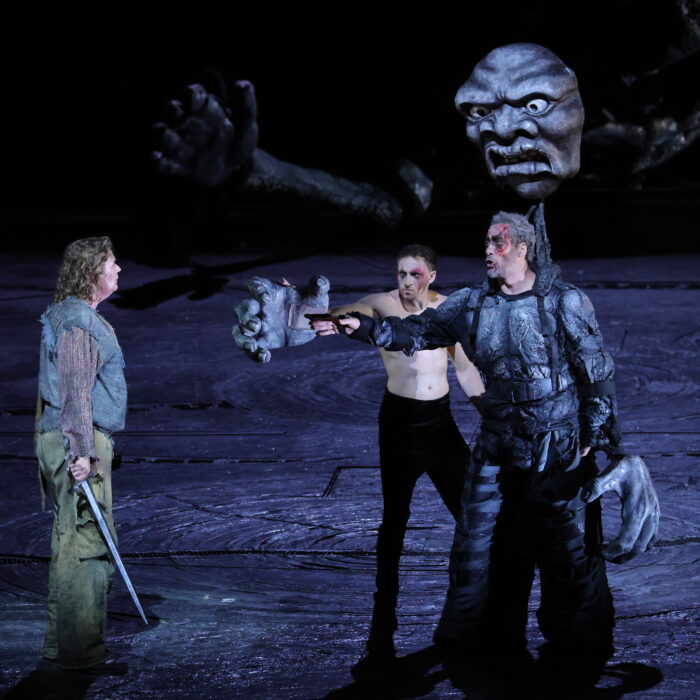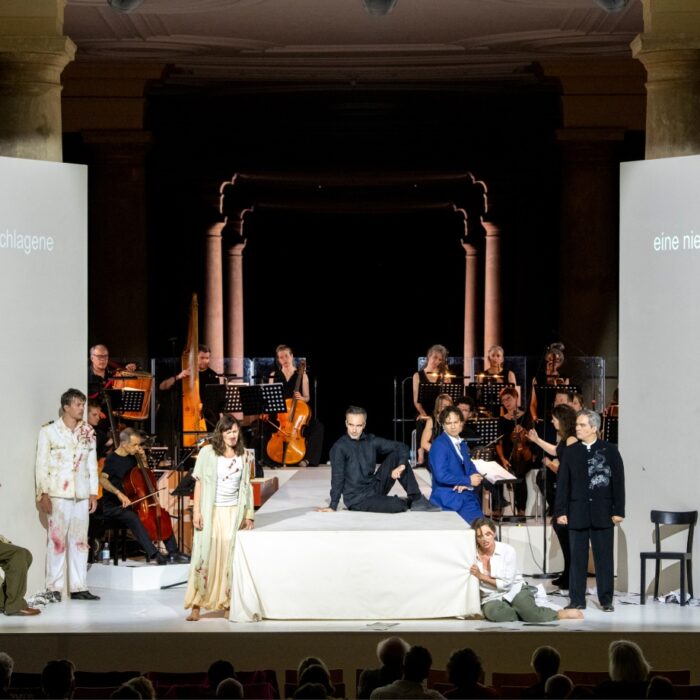
Deutsche Oper Berlin 2017-18 Review – La Traviata: Kristina Mkhitaryan’s Outstanding Violetta Gains the Russian Soprano “Prima Donna Assoluta” Status
By Jonathan SutherlandThe Deutsche Oper Berlin has long been a mecca for iconoclast regie theater directors ranging from Hans Neuenfels and Claus Guth to Ole Anders Tandberg, whose recent staging of “Carmen” had more viscera on the stage than verismo. Curiously, the extant production of “La Traviata” by the former Deutsche Oper Intendant Götz Friedrich, dating back to 1999, is surprisingly uncontroversial. In his programme notes Friedrich avers that despite silly socialites simulating palm-reading gypsies and testosterone-fueled roués masquerading as virile matadors, the pallor of death permeates Piave’s libretto. Consequently, Frank Philipp Schlößmann’s single stage set is essentially an elegant, very black mausoleum.
The Populated Desert Known As Paris
Violetta’s sense of loneliness in the “popoloso deserto che appellano Parigi” is exemplified during the Preludio by a small bed in the middle of an extremely large room, anticipating the scene of her demise two Acts later. The spacious salon also has multiple doors leading to the unknown, similar to Bluebeard’s Castle but with fewer nasty surprises. There is certainly plenty of contrasting frivolity in the opening “Giocammo da Flora” hubbub and Klaus Bruns’ belle époque evening dress costuming makes it obvious that Violetta’s friends and freeloaders are far from riff-raff sneaking out of the 19th arrondissement. The party crowd is unquestionably the crème de la crème of Parisian society, even if slightly clotted. A tuxedoed gentleman pilfers one of Violetta’s silver salvers on his way out which would have been an original idea if it hadn’t already been done with a snuff-box in Franco Zeffirelli’s film version back in 1983. Violetta’s society mask was as perfect as her immaculate coiffure and except for the absence of a dining table at which Violetta should be seated between Alfredo and Gastone during the Brindisi, Friedrich’s direction was close to the libretto. There was an amusing horticultural anomaly in that the white camellia Violetta gives to Alfredo was about the size of a dahlia which would have won multiple prizes at the Chelsea Flower Show.
The permanent black-walled room worked less well for the country scene even with the tall doors thrown open to show trees in the background. Violetta’s escritoire looked more like a kiddy school desk, but after all, she is saving the centimes. The text has Alfredo returning from hunting but his peaked cap and cream linen suit were more suitable for a round of golf. There was a clever piece of business with the astute Annina eves-dropping on the fateful altercation between her mistress and Germont. This was a faithful servant with plenty of street-smarts. Flora’s party pad was a permanent absinthe doused bordello cum private casino. Unsurprisingly, her residence, at least in shape and diameter, was identical to chez Valéry. The final scene reverted to the Preludio setting with a single bed in the center of the vast room. The tall doors at the back were opened to show the passing Carnival and some giant ghoulish Mexican “Día de los Muertos” figures on stilts looked in with ominous foreboding.
Friedrich’s characterizations were generally well-thoughtout, if not always fulfilled by all the interpreters. There was a clever twist in père Germont’s scena with Violetta when during his ostensibly reassuring “bella voi siete e giovine,” the sanctimonious hypocrite from Provence actually made a pass at the reformed courtesan. Her response of “Ah, più non dite” took on quite a new meaning.
Sempre Presto
Musically this was an uneven performance with conductor Carlo Montanaro seemingly intent on turning the opera into “sempre presto.” Many passages sounded more like Rossini than Verdi and at several instances the synchronization between pit and chorus, such as “Si ridesta in ciel l’aura” and “Largo al quadrupede sir della festa” came perilously close to an irrevocable rift. The opening chorus with chirpy piccolo and flutes is allegro brillantissimo e molto vivace, but this is hardly the dominant pace of the full score. “Un di felice” is marked andantino but was closer to allegro. Similarly, the indication for “Di Provenza” is andante piuttosto moso not moderato. There was little room for the singers to exercise portamenti a piacere and it was only the confidence of Violetta and Giorgio Germont which persuaded the precipitate maestro to follow their fermate. That said, there were some pleasing moments from the pit. The ethereal ppp opening to the Preludio with precise slurs repeated in Act three was played with gossamer lightness and tender tremoli by the high strings. The closing morendo pppp had the optimal soupçon of a sonority. First clarinet solos before “che gli dirò”, “Amami Alfredo” and accompanying “Teneste la promessa” were poignant and sensitively phrased.
More Consistency
Vocally things were much more consistent with some fine comprimario performances from Sam Roberts-Smith as a youthful and engaged Marquis de Obigny and Alvaro Zambrano as a garrolous Gastone. Both were noticeably solid in the ensembles, particularly the extended concertante ending Act two. Andrew Harris was an impressive Dr. Grenvil with a warm honey timbre. The low C natural on “poche ore” was rich and resonant. Sandra Hamaoul was a much more involved Annina than usual and there was real concern in the “Lo spendio è grande a viver qui solinghi” recitative. Her shock at the implications of delivering Violetta’s letter to Flora spoke volumes in the simple “ah.” The dastardly Baron Douphol sung by Derek Walton was vocally less secure although his outrage after Alfredo’s scandalous behavior in “A questa donna l’atroce insulto” was menacing. Vasilisa Berzhanskaya sang a vampy, chutzpah-filled Flora who, like a deft dominatrix, knew how to keep the philandering marquis on a short leash.
A Fine Germont
Gabriele Viviani was a youthful looking Giorgio Germont who was clearly not oblivious to Violetta’s charms. Alfredo’s father is certainly not a sympathetic role but the Lucca-born baritone made the character much less obnoxious than usual. Viviani has an especially strong top and the high F on “al vincolo” in “Pura si come un angelo” and upper G and E flats in “Di Provenza il mar” displayed a rich and resilient timbre. The preceding “orgoglio e vanto” recitative had a robust Cappuccilli-like resonance and the top G on “ma” preceding “se alfin” could have been Siegfried. Although the first “Dio mi guidò” rising to a top F and later “Dio m’esaudi”phrases were correctly sung forte, the contrasting repeated words should be ppp. It was a bonus to hear the usually cut “No, non udrai rimproveri” cabaletta and although it was well-sung with a rollicking Rossinian swing, its musical merits are certainly debatable. A trumpeted high F on “Ah, ferma” closing the scene had plenty of puissance without losing tone quality. The dramatic “Di sprezzo degno sé stesso rende” was delivered with the dread of Damocles and some oracular top E flats. In an indication of Viviani’s fine acting skills, Germont’s overdue “Il mal ch’io feci ora sol vedo!” actually sounded sincere.
Son, Unlike Father
Attilo Glaser was less successful as Alfredo. More familiar with Mozart and lieder repertory, Gasler’s lyrical tenor lacked Verdian squillo or ping. The Brindisi is marked “con grazia leggerissimo” but Gasler had neither grace nor lightness. “Un di felice, innante” sounded anything but happy and was slightly labored. The A flat fermata on “suoi” in the Act two opening recitative and sustained G natural on “quasi” in the aria were pushed but not uncomfortable-sounding as the interpolated high C on “laverò” in the cabaletta. Gasler’s acting skills were not exactly Academy Award worthy either and his mild exasperation at reading Violetta’s letter of separation was as if she he sent him a copy of her laundry list. “Ogni suo aver tal femmina” had more punch but his jealous denunciation of Violetta was more courtly than corybantic. It was hard to imagine what the discerning Parisian seductress could have seen in this rather uninspired country bumpkin.
Prima Donna Assoluta
There was nothing insipid about Kristina Mkhitaryan in the title role. The Russian soprano sang a critically acclaimed Violetta at Glyndebourne last year, but better direction by Gerlinde Pelkowski in Berlin made this in all respects an outstanding performance. Although diminutive in stature, Mkhitaryan bears a physical similarity to Teresa Stratas with correspondingly impressive acting ability. From her first “Flora, amici, la notte che resta,” it was clear this was a Violetta of the first rank. The conviction underlying “tutto è follia nel mondo” was entirely credible while the sustained top B flat at the end of the Brindisi dominated the ensemble. The hesitant vulnerability with which Mkhitaryan murmured “Un cor? sì, forse” was mesmerizing. “Ah, fors’è lui” was meticulously executed with tastefully judged fermate on the top A flats on “tumulti” and “occulti.” Dynamic changes were scrupulously observed with crisp and varied word colorings. The semiquaver roulades were pristine and “Follie! follie!” sung with reckless, but accurate abandon. Mkhitaryan knocked off the top D flat at the end of the second “gioir” as if it was a warming up exercise. The vocal pyrotechnics in “Sempre libra” included a stellar top C fermata on “ritrovi” and pearl drop descending trilling semiquaver scales before taking the interpolated stratospheric top E flat on “Pensier” with the dynamism of Dessay or assurance of Sutherland.
The second act confrontation with Alfredo’s loathsome father brought out the best of Mkhitaryan’s excellent acting skills and as the offended châtelaine, “Donna son io, signore, ed in mia casa” was exactly “risentita, alzandosi” as Piave intended. There was a soaring crescendo to top A on “Dio lo cancellò” and the bitter acknowledgment that she really didn’t deserve her recent happiness in “era felice troppo” fading to a beguiling A flat was deeply moving. “Dite alla giovine” had a plaintive purity which could have been vintage Cotrubas. There was a seismic eruption on “Amami, Alfredo, quant’io t’amo” rising to a searing B flat fermata. The lad from Provence must have been extremely dim not to notice there was something a seriously amiss with his distraught paramour. Similarly, the wrenching “Alfredo, Alfredo, di questo core non puoi comprendere tutto l’amore” had a superbly measured crescendo to sumptuous B flat on “salvi allora.” Mkhitaryan’s meticulously controlled mezza voce was evident in the final Act and “e tardi!” after reading Germont’s letter seemed to slide down to her bedroom slippers. “Addio del passato” was precisely “legato e dolce” as marked with a perfectly pitched piano top A natural on “fini” with the ideal “fil di voce” that Verdi indicated. The “Parigi o cara” duet was wracked with hopeless self-delusion and Violetta’s dramatic demise elicited the requisite empathy without being kitsch or contrived.
After last year’s Glyndeboune “Traviata,” the London Telegraph described Mkhitaryan as “the new Netrebko.” Great expectations indeed but if her Violetta is anything to go by, there is no doubt this sensational soprano from Novorossyisk has a dazzling future.


